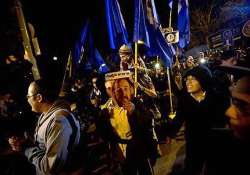Heavy security at contested Jerusalem shrine
Jerusalem: Israel's prime minister blamed “militant Islamic incitement” for growing tensions in Jerusalem, especially at a contested holy site that was ringed Friday by hundreds of Israeli riot police as about 15,000 Muslims performed weekly

Jerusalem: Israel's prime minister blamed “militant Islamic incitement” for growing tensions in Jerusalem, especially at a contested holy site that was ringed Friday by hundreds of Israeli riot police as about 15,000 Muslims performed weekly prayers there.
Prayers ended peacefully, though clashes erupted again later in the day between Palestinian stone-throwers and Israeli troops in an Arab neighborhood of Jerusalem and at the main Israeli checkpoint on the outskirts of the city.
Tensions have been rising in recent weeks over the Jerusalem shrine, known to Muslims as Haram as-Sharif, or Noble Sanctuary, and to Jews as the Temple Mount.
The complex, the third holiest site in Islam, houses the Al-Aqsa Mosque and the gold-topped Dome of the Rock. Jews also revere it as the location of their biblical temples and consider it the most sacred location in their faith.
Since Israel captured the sacred plateau, along with the rest of east Jerusalem, from Jordan in 1967, Jewish worshippers have been allowed to visit—but not pray—at the site. The area is run by Muslim authorities under Jordanian custody.
In recent months, several senior members of Israeli Prime Minister Benjamin Netanyahu's coalition, including Housing Minister Uri Ariel and Deputy Parliament Speaker Moshe Feiglin, have called for a greater Jewish presence and the right to prayer on the mount.
At the same time, the number of Jewish visitors to the site has increased over the years, raising fears among Muslims that this is part of a gradual Jewish takeover.
On Friday, 1,300 Israeli riot police fanned out around the mosque compound in Jerusalem's Old City, sealing off access roads to enforce a government decision to bar Muslim men under the age of 35 from praying there. The age limit varies from Friday to Friday.Riot police manned metal barricades, checking identity papers and directing pedestrians.
At one checkpoint in the Wadi Joz area, just outside the Old City, some 500 young Palestinians who were denied entry to the mosque compound because of their age performed prayers on a street, kneeling on carpets spread on the asphalt. They were faced by a row of riot police in black uniforms and helmets, as well as several officers on horseback.
“We are steadfast here,” said one of the worshippers, who only identified himself by his first name, Raed, for fear of Israeli repercussions. “We pray here despite the Israeli restraints.”
In the Old City, 62-year-old Walid Mohammed blamed Israel for ratcheting up tensions in the area, as dozens of police officers patrolled nervously in front of his coffee shop.
“The arrogance of the Israeli government is the main cause of troubles in our country,” he said. “They want to control the Al-Aqsa Mosque.”